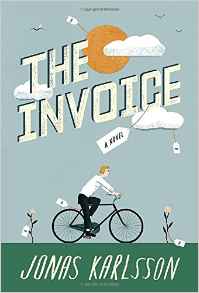The Invoice by Jonas Karlsson
 Friday, December 9, 2016 at 7:25AM
Friday, December 9, 2016 at 7:25AM 
Published in Sweden in 2011; published in translation by Hogarth on July 12, 2016
If Kafka had a sense of humor, if he had been less dark and gloomy, he might have written The Invoice. The novel imagines a scenario in which irrational rules are imposed and people have no choice but to follow them without understanding why. But unlike Kafka’s Josef K, the bureaucrats in The Invoice are only too happy to explain his obligations to the novel’s narrator, although in terms he can’t possibly understand. Of course, every time the narrator meets with the bureaucrats, his efforts to make things better only worsen his predicament.
The Invoice is Jonas Karlsson’s latest contribution to the field of absurdist literature, following The Room. While The Room is darkly amusing, The Invoice is brightly amusing. It is a novel that reminds us to value all the small things that make us happy, notwithstanding the bureaucrats who make a mission of impeding joy.
The unnamed narrator of The Invoice receives a bill for 5.7 million kroner. He doesn’t know what the bill is for, but he is confident that he didn’t incur the debt. He also knows he doesn’t have 5.7 million kroner. After he gets a second bill, he calls the number on the invoice and after a long wait, speaks to a live person who tells him that he is being billed for the experiences that have made him happy. It seems as if Sweden has a happiness tax, although it’s actually being implemented worldwide. An interesting idea, although in the United States an anger tax would probably generate more revenue.
The narrator’s problem is that he isn’t angry often enough, and so has incurred a huge debt for the things (like sunshine) that make him happy. With a job in a video rental store and no girlfriend, it doesn’t seem as though he should have accrued such a large debt. He’s so desperate for female companionship, in fact, that he develops a crush on the administrator he keeps phoning to discuss his inability to pay the debt. One of the novel’s points, I think, is that it’s possible to make a connection with another person under even the most unlikely circumstances.
Like The Room, The Invoice pokes fun at cabined, bureaucratic thinking. But it also sends a life-affirming message. The narrator really doesn’t realize he’s happy, even denies that he’s happy, because he has chosen not to take advantage of opportunities to be happy. He is a slave to habitual behavior. He lacks the spontaneity to seize the moment. He goes with the flow. He envies people who have the ability to “look after themselves and sort things out.” Forced to think about his easy, uneventful life, he concludes “it’s pretty damn tragic.”
At the same time, it is exactly those traits that have caused his tax debt to mount. He doesn’t crave money. He doesn’t care that he has a dead-end job. He doesn’t worry that he has too few friends. He came through a break-up without feeling bad about himself. He’s content when he eats a combination of mint chocolate and raspberry ice cream, when he breathes in the mild summer air. To other Swedes, the narrator might seem dull and unambitious, but The Invoice seems to suggest that those traits are worth cultivating if they help us appreciate the joy of life’s simplest pleasures.
RECOMMENDED



